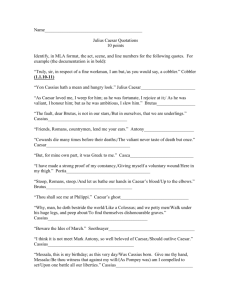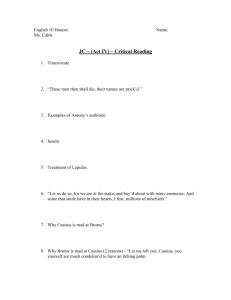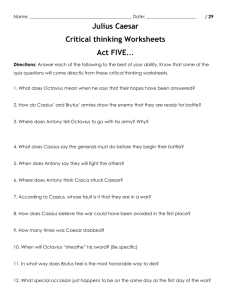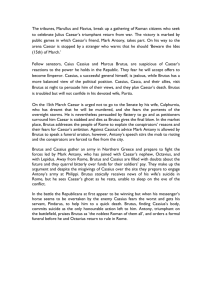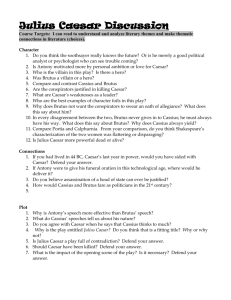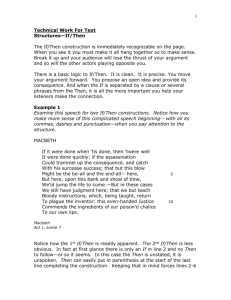ACT V notes
advertisement
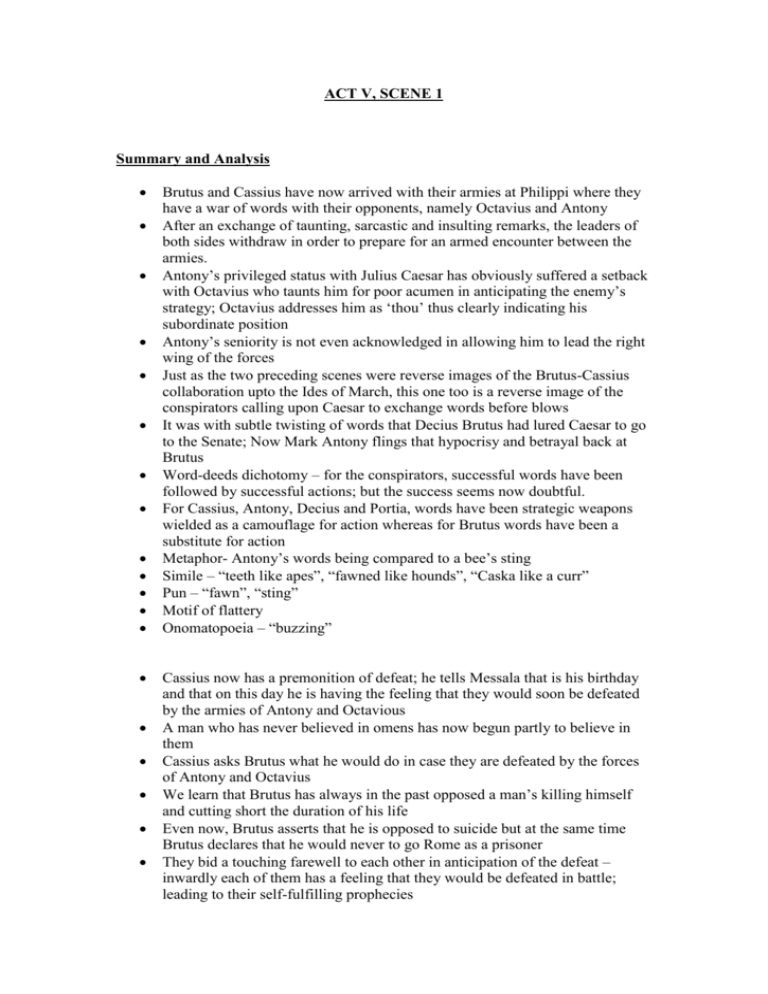
ACT V, SCENE 1 Summary and Analysis Brutus and Cassius have now arrived with their armies at Philippi where they have a war of words with their opponents, namely Octavius and Antony After an exchange of taunting, sarcastic and insulting remarks, the leaders of both sides withdraw in order to prepare for an armed encounter between the armies. Antony’s privileged status with Julius Caesar has obviously suffered a setback with Octavius who taunts him for poor acumen in anticipating the enemy’s strategy; Octavius addresses him as ‘thou’ thus clearly indicating his subordinate position Antony’s seniority is not even acknowledged in allowing him to lead the right wing of the forces Just as the two preceding scenes were reverse images of the Brutus-Cassius collaboration upto the Ides of March, this one too is a reverse image of the conspirators calling upon Caesar to exchange words before blows It was with subtle twisting of words that Decius Brutus had lured Caesar to go to the Senate; Now Mark Antony flings that hypocrisy and betrayal back at Brutus Word-deeds dichotomy – for the conspirators, successful words have been followed by successful actions; but the success seems now doubtful. For Cassius, Antony, Decius and Portia, words have been strategic weapons wielded as a camouflage for action whereas for Brutus words have been a substitute for action Metaphor- Antony’s words being compared to a bee’s sting Simile – “teeth like apes”, “fawned like hounds”, “Caska like a curr” Pun – “fawn”, “sting” Motif of flattery Onomatopoeia – “buzzing” Cassius now has a premonition of defeat; he tells Messala that is his birthday and that on this day he is having the feeling that they would soon be defeated by the armies of Antony and Octavious A man who has never believed in omens has now begun partly to believe in them Cassius asks Brutus what he would do in case they are defeated by the forces of Antony and Octavius We learn that Brutus has always in the past opposed a man’s killing himself and cutting short the duration of his life Even now, Brutus asserts that he is opposed to suicide but at the same time Brutus declares that he would never to go Rome as a prisoner They bid a touching farewell to each other in anticipation of the defeat – inwardly each of them has a feeling that they would be defeated in battle; leading to their self-fulfilling prophecies As they marched Caesar to his death, then they march forth to meet their own deaths now Cassius has scoffed at Casca’s superstition, and Caesar’s, during the portentous night. Now as he braves the battle, he reads the bird omens signifying that it will also be the day of his death The spirit of Caesar comes to Cassius in the form of ominous vultures with whom he had compared Caesar in the earlier storm For the first and last time, Cassius will remind Brutus of his folly in rejecting his advice and sparing Antony – the price for the rejection of Cassius final advice on awaiting attack is still to be paid but he confides to Messala that he fears the worst Epicurus – a Greek philosopher who advocated personal tranquillity, claimed that the gods were indifferent to human activities and therefore sent no omens ACT V, Scene iii As Artemidorus had handed C a written message warning him of his impending doom, her Brutus sends a message to Cassius to advise him on the battle. Failure to read Artemidorus’s letter led Caesar to his death and failure to receive Brutus’ letter will lead to Cassius’s death. Cassiu: O, look, Titinius, look the villains fly! – Cassius: Guide thou the sword. Caesar, thou are revenged” Brutus orders Mssals to launch an attack on Octavius’s forces who are not fighting whole-heartedly Cassius in the meanwhile feels that his forces are not making much headway. He asks Titinius to mount his horse and ride to a certain location in the distance to find out whether the troops there are their own or the enemy’s Cassius then asks Pindarus to climb up the nearby hill and watch what progress Titinius is making. Pindarus reports to Cassius that Titanius seems to have been captured by the enemy troops in the distance Cassius feels deeply dejected and decides to commit suicide – he gives his sword to Pindarus and asks him to kill him The actual fact was that Titanius had been surrounded by Brutus’ soldiers who were coming to inform him of Brutus’s victory Brutus’ soldiers were bringing a wreath from Brutus to crown Cassius with it In this scene, the weakening of the Republican forces is clearly indicated to us Cassius is stabbed with his own sword or dagger, the same with which he stabbed Julius Caesar Brutus’s glimmer of hope in the previous scene is seen as illusory It is ironic that Cassius who has always perceived the practial realities of the situation around him, is now finally and fatally misled by his servant’s report The presentation of /Cassius has changed subtly but drastically in the play in comparison with his soliloquy in Act I, Scene ii. There Cassius, driven by envy and hatred, was a subtle scheming Machiavellian But the Cassius of the quarrel scene was a man of dignity, sensitivity and human warmth And in a series of details since then (the belief in omens, the meditation of his birthday, the farewell to Brutus) Shakespeare shows another side of Cassius Until the assassination, the unscrupulous Cassius and the honest Brutus were in dramatic contrast; after the assassination the conflict and contrast is largely between Antony and the conspirators Another aspect of the man is revealed, which adds pathos to his death Cassius had predicted before that he will take his own life, and now,as he does, he is able to remark on the irony of the act: Caesar’s murderer has become his revenger Before the murder of C, Cassius ahd been about to kill himself under the mistaken assumption that Popilus was divulging the plot to C. He nw carries out his resolution mistaking Titinius’s welcome by friends for an attack by enemies. Ca’s death was followed by the poet Cinna’s. Cassius suicide is followed by that of Titinius. As Portia’s suicide resulted from an erroneous misconstruction of Brutus’ situation and action so does Cassius. Brutus acknowledgement that it is the spirit of C that drove Cassius to kill himself with the very sword that killed him is his only, though tacit, acceptance of the failure of the conspiracy. That the wheel had come full circle is clearly suggested by Cassius’s metaphor of the compass and the day of his birth being the day of his death. In the very middle of Cassius incitement of Brutus was Casca’s repot of the crown thrice offered by Antony to the victorious C which whetted the urgently to get rid of C and he was killed with high hope. In the very middle of Brutus’ winning battle with Oct, Pindarus report to Cassius of the shouting and cheering with which Titinius is greeted aggravates Cassius depression and he kills himself in despair. Tit brings a wreath of victory sent by the victorious Brutus to Cassius. The victor’s crown is mentioned thrice in 16 lines. Antony addressed the dead boy of C and convinced the crowd that C had been construed by Brutus and Cassius. Titinius addressed the dead boy of Cassius and laments that the fortunes of Brutus had been misconstrued by him. After Caesar was killed, his friend the poet Cinna was also killed. After Cassius’ suicide, Titinius also commits suicide. C was given a state funeral but Cinna’s death was shrouded in silence. Cassius body is sent to Thasos; Titinius is passed over in silence. ACT V, Scene v Brutus: Why this Voluminous – Octavius: To part the glories of this day” Shows us the final stroke of nemesis in the death of Brutus – he is now certain of defeat He tries to persuade one after another of his men to run through with a sword but they all refuse He persuades Strato hold sword and Brutus falls upon his own sword and gives himself a fatal wound Antony pronounces a brief but moving eulogy, “This was the noblest Roman of them all” We have watched Brutus through a long succession of reverses, in which his noble motives became continually entangled with and frustrated by the realities of the world of political and military action But the simple statement “have glory by this losing day” reminds us of the direct, honest, uncomplicated character that he is Brutus’ dying reference to Caesar indicates again that the force that the dead Caesar has exerted throughout the second half of the play Caesar alive may have been pompous, tyrannical and cruel; Caesar dead, “the spirit of Caesar”, that Brutus tried to destroy, has been all-powerful Antony’s bloody prophecy, made over his body, has been fulfilled He was present in the minds of the conspirators as they quarrelled His ghost, appearing to Brutus, introduced the final moment of the action Cassius died with Caesar’s name on his lips and Brutus, finding Cassius dead, spoke lines which sum up the action of the play: “O Julius Caesar, thou art mighty yet!/ Thy spirit walks abroad and turns our swords/In our own proper entrails In most of Shakespeare’s tragedies there comes, at the play’s end, a brief, final moment of calm. The conflict of the play has run its course, the hero is dead, and there is usually a speech which concludes the action on a quiet, mournful note Here the speech is given by Antony, and it is a moving tribute to Brutus’ qualities. There is no need to question Antony’s consistency here. The passions of the struggle have gone, and Antony and Octavius both speak, not so much as particular characters, but as representative Romans mourning a dead hero without reference to political faction Antony says “that of all of them had slain Caesar, there was none but Brutus only that was moved to do it, as thinking he..(and the next couple of lines):”..only Brutus joined the assassination because of his democratic ideals and because of his wish to do good to the common people The sad remainder of friends seems reduced to the expedient of helping Brutus kill himself as earlier his fellow conspirators were enthused about helping him kill C. The link between his suicide and the murder of C is provided by Brutus’ own dying words. Antony who eulogized C also pronounces a eulogy on Brutus. B dies as unquestioning of himself as he lived and he dies happy with himself. Oct survives to reap and share the glories of the happy day. Now A but Oct has the last word.

